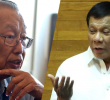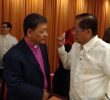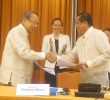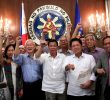Reply of the NDFP to the Opening Statement of Presidential Peace Adviser Jesus Dureza
Reply to the Opening Statement of Peace Adviser Jesus G. Dureza
dated May 27, 2017 by the Negotiating Panel,
National Democratic Front of the Philippines
The National Democratic Front of the Philippines (NDFP) vehemently deplores the GRP Panel’s decision not to participate in the fifth round of formal negotiations.
The GRP’s persistent demand for the immediate signing of a bilateral ceasefire agreement as precondition to the continuation of the formal talks is an outright violation of the 1992 Hague Joint Declaration. The NDFP stands by its position, priorly acknowledged and concurred with by the GRP, that the implementation of CARHRIHL and the forging of the CASER should take precedence over the crafting of a bilateral ceasefire agreement.
In what would have been his opening statement, NDFP panel chair Fidel Agcaoili urged for a return to the framework agreement which eloquently defines the proper sequence in forging the comprehensive agreements on human rights, social and economic reforms and political and constitutional reforms as the solid bases for the comprehensive agreement on ending the hostilities. Implementing social, economic and political reforms is the only way to enduring peace.
OPAPP Secretary Dureza’s assertion that the CPP order to the NPA to launch more tactical offensives in response to the imposition of Martial Law in Mindanao “puts in great jeopardy” the quest for peace totally obscures the fact that the GRP has been waging an “all-out-war” against the NPA, conducting offensive operations and aerial bombings of communities regardless of “collateral damage” — all on the direct and standing orders of President Duterte.
Contrary to the GRP allegations, the NPA operations cannot be attributed to the failure of the CPP-NPA-NDFP leadership to control their ground forces. Rather, they are defensive and counter-offensive responses to the AFP provocative actions and offensive operations.
Contrary to its declared purpose, the imposition of Martial Law in Mindanao, with threats to extend this throughout the archipelago, is bound to further escalate the armed conflict, aggravate the human rights situation and exacerbate the suffering of the people. It bestows a veneer of legality to justify the escalation of warrantless arrests, searches and seizures as well as indefinite detention targeting entire civilian communities suspected of supporting rebel and other armed groups. It further emboldens the AFP, PNP and other state-sponsored armed groups to perpetrate extrajudicial killings, illegal arrests and detention, forced evacuation, filing of trumped-up charges, threats, intimidation and other human rights violations with impunity. The revolutionary movement is therefore completely justified in calling on the people and its forces to defend themselves against these intensifying attacks.
The GRP completely glosses over the fact that undeclared Martial Law has long been existing in vast areas of the countryside. As of February 2017, at least 500 barangays in 146 towns in 43 provinces have been subjected to various kinds of offensive military operations.
The NDFP has acknowledged the role played by President Rodrigo Duterte in resuming the peace talks, affirming previously signed agreements and bringing the negotiations on the Comprehensive Agreement on Social and Economic Reforms (CASER) to its current unprecedented level. The NDFP considers these as important confidence-building measures as well as acknowledgement of the GRP’s obligations under previously signed agreements and its duty to uphold human rights, social justice and the people’s welfare.
However, there is no truth to the claim that the GRP has complied with all of its obligations and commitments, especially the release of political prisoners who are unjustly detained.
There is no basis for the GRP’s claim that there is a sudden and perceptible erosion of public support to the peace talks. The marked progress in the talks in the past months has in fact heightened the people’s interest and confidence that the negotiations could lead to social and economic reforms that would improve their lives. President Duterte himself has gained political capital emanating from the people’s support for the peace talks.
There is likewise no basis for the supposed clamor for localized peace talks given its inherent inability and historical failure to achieve overarching reforms. Localized peace talks have been used to fragment revolutionary groups and enable military intelligence and offensive operations. Especially under Martial Law, localized peace talks facilitates tight surveillance, including the use of drones with GPS, and motorcycle-riding death squads.
The GRP’s decision not to participate in the 5th round of formal talks threatens to squander the goodwill and the gains that have already been achieved in the peace negotiations in the past nine months, especially in the crafting of a substantive agreement on social and economic reforms.
The NDFP has pursued the negotiations with the Duterte government in good faith, and in a non-adversarial fashion, likewise presuming the other Party’s good faith.
However, it has been continually besieged by conflicting, contradictory, and cross-purpose statements and actions that have beclouded the real intentions of the GRP.
The people’s interest, immediate and long term, is the paramount consideration in the NDFP’s engagement in negotiations to resolve the armed conflict and achieve a just peace.
The NDFP is ready to resume the fifth round of formal talks on the substantive agenda of social and economic reforms when the GRP is willing to do so.









